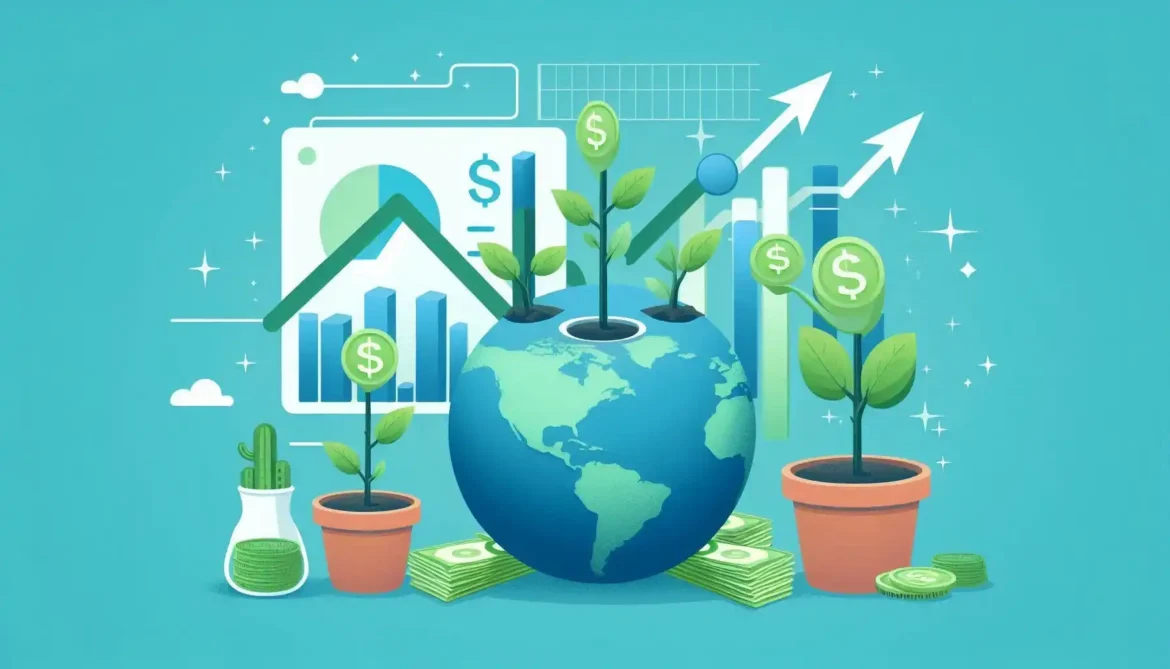
Sustainable Investing: How to Make a Positive Impact with Your Money
We’ve all become increasingly aware of the urgent need for environmental and social change. But how can we, as individuals, contribute to a more sustainable future? One powerful way is through our investment choices. Sustainable investing, also known as responsible investing or impact investing, allows us to align our financial goals with our values, generating returns while contributing to a better world. It’s not about sacrificing returns for ethics; rather, it’s about recognizing that responsible companies are often more resilient and innovative in the long run.
This article will delve into the world of sustainable investing, exploring different approaches and providing practical guidance on how you can start making a positive impact with your money.
Understanding the Different Approaches:
Sustainable investing encompasses a variety of strategies. We find it useful to categorize them as follows:
- Environmental, Social, and Governance (ESG) Investing: This is a broad approach that considers ESG factors in investment decisions. ESG criteria encompass environmental factors (e.g., carbon emissions, waste management), social factors (e.g., labor practices, human rights), and governance factors (e.g., board diversity, executive compensation). Many mainstream investment firms now incorporate ESG factors into their analysis, reflecting a growing demand from investors.
- Impact Investing: This strategy focuses on investments that directly aim to generate positive social and environmental impact alongside a financial return. Impact investors actively seek out companies or projects with demonstrable societal benefits, such as renewable energy projects or affordable housing initiatives.
- Negative Screening (Exclusionary Screening): This involves excluding companies involved in specific activities considered harmful, such as those engaged in tobacco production, fossil fuels, or weapons manufacturing. This approach allows investors to align their portfolios with their personal ethical values.
- Thematic Investing: This focuses on investments in sectors or industries contributing to solutions for global challenges, such as clean energy, sustainable agriculture, or circular economy businesses.
Table 1: Comparison of Sustainable Investing Approaches
| Approach | Focus | Impact Measurement | Risk Profile |
| ESG Investing | Integrating ESG factors into investment decisions | Often through ESG ratings and scores | Varies, generally similar to traditional investing |
| Impact Investing | Generating measurable positive social/environmental impact | Through direct impact measurement | Moderate to High |
| Negative Screening (Exclusionary) | Excluding companies involved in harmful activities | Indirect, through avoiding harmful sectors | Generally similar to traditional investing |
| Thematic Investing | Investing in sectors addressing global challenges | Through sector performance and impact reports | Moderate to High |
Choosing the Right Approach for You:
The best approach depends on your individual financial goals, risk tolerance, and ethical priorities. We encourage you to carefully consider your values and long-term investment objectives before making any decisions. Don’t hesitate to seek professional advice from a financial advisor specializing in sustainable investing.
“Investing in sustainable businesses isn’t just about doing good; it’s about doing well. Companies that prioritize sustainability are often better positioned for long-term success.” – Unknown
Practical Steps to Get Started:
- Educate Yourself: Research different sustainable investment options and understand the terminology. Numerous resources are available online and through financial institutions.
- Define Your Values: Determine which social and environmental issues are most important to you. This will guide your investment choices.
- Assess Your Risk Tolerance: Sustainable investments, like any other investment, carry varying levels of risk. Choose strategies that align with your comfort level.
- Diversify Your Portfolio: Don’t put all your eggs in one basket. Diversification helps mitigate risk and maximize potential returns.
- Choose Your Investment Vehicles: Consider options such as ESG mutual funds, impact bonds, or directly investing in sustainable companies.
- Monitor and Evaluate: Regularly track your investments and assess their performance against your goals and values.
Frequently Asked Questions (FAQs):
- Q: Are sustainable investments less profitable than traditional investments?
- A: There’s no consistent evidence that sustainable investments underperform traditional investments. In fact, many studies suggest that ESG factors can be positively correlated with long-term financial performance.
- Q: How can I measure the impact of my sustainable investments?
- A: The measurement of impact varies depending on the approach. ESG investing often relies on ratings and scores, while impact investing requires more detailed impact measurement through reporting and data collection.
- Q: What are some reputable sources for information on sustainable investing?
- A: We recommend looking at organizations like the Global Reporting Initiative (GRI), the Sustainability Accounting Standards Board (SASB), and various independent ESG rating agencies. Your financial advisor can also provide valuable resources.
- Q: What are the potential risks associated with sustainable investing?
- A: The main risks are similar to those of traditional investing, including market fluctuations and potential underperformance. However, some niche sustainable investments might carry higher risks due to their smaller size or focus on emerging markets.
In conclusion, sustainable investing allows us to align our financial decisions with our values, contributing to a more sustainable future while potentially achieving strong financial returns. By understanding the different approaches and taking practical steps, we can all play a part in creating a positive impact through our investments. It requires research, careful planning and a long-term perspective, but the potential for both financial gain and positive social and environmental change is significant.
Sustainable Investing: How to Make a Positive Impact with Your Money
As we continue to navigate the complexities of the modern world, it’s becoming increasingly clear that our financial decisions have a significant impact on the environment and society. We, as investors, have the power to shape the future by making conscious choices about where we put our money. Sustainable investing, also known as environmental, social, and governance (ESG) investing, is an approach that considers not only financial returns but also the social and environmental implications of our investments. In this article, we will explore the world of sustainable investing and provide guidance on how to make a positive impact with your money.
“The way to get started is to quit talking and begin doing.” – Walt Disney, highlighting the importance of taking action towards creating a better future.
Why Sustainable Investing Matters
Sustainable investing is no longer a niche concept, but a growing trend that is gaining momentum worldwide. We believe that it’s essential to consider the long-term effects of our investments on the planet and its inhabitants. By choosing sustainable investments, we can contribute to:
- Reducing carbon emissions and mitigating climate change
- Promoting social justice and human rights
- Supporting companies that adopt responsible business practices
- Encouraging innovation and sustainable development
Table 1: Benefits of Sustainable Investing
| Benefits | Description |
| Environmental | Reduced carbon footprint, conservation of natural resources |
| Social | Promotion of fair labor practices, human rights, and community development |
| Governance | Encouragement of transparent and accountable business practices |
| Financial | Potential for long-term financial returns, reduced risk |
How to Get Started with Sustainable Investing
We understand that navigating the world of sustainable investing can be overwhelming, especially for those new to investing. Here are some steps to help you get started:
- Define your values: Identify what matters most to you, whether it’s environmental issues, social justice, or governance.
- Assess your portfolio: Review your existing investments and consider their ESG performance.
- Research sustainable investment options: Look for funds, stocks, or bonds that align with your values and goals.
- Consult with a financial advisor: If needed, seek professional advice to create a personalized investment strategy.
Some popular sustainable investment options include:
- Renewable energy stocks: Companies that specialize in solar, wind, or hydro energy
- ESG-themed funds: Funds that focus on specific ESG criteria, such as low-carbon or gender equality
- Impact bonds: Bonds that support projects with positive social or environmental impacts
Types of Sustainable Investments
We’ve identified several types of sustainable investments that cater to different values and goals:
- Socially responsible investing (SRI): Excludes companies that engage in activities deemed unethical, such as tobacco or weapons production
- Environmental investing: Focuses on companies that promote sustainable practices, such as renewable energy or sustainable agriculture
- Impact investing: Seeks to generate both financial returns and positive social or environmental impacts
Frequently Asked Questions (FAQs)
We’ve compiled a list of common questions about sustainable investing:
- Q: Is sustainable investing only for environmentalists?
- A: No, sustainable investing is for anyone who wants to make a positive impact with their money, regardless of their personal values or interests.
- Q: Do sustainable investments perform poorly financially?
- A: Not necessarily. Many sustainable investments have been shown to perform similarly to or even outperform traditional investments.
- Q: How can I measure the ESG performance of my investments?
- A: You can use various ESG ratings and metrics, such as the Global Reporting Initiative (GRI) or the Carbon Disclosure Project (CDP).
Tips for Effective Sustainable Investing
We’ve gathered some expert tips to help you make the most of your sustainable investments:
- Diversify your portfolio: Spread your investments across different asset classes and industries to minimize risk.
- Monitor and adjust: Regularly review your investments and rebalance your portfolio as needed.
- Engage with companies: Use your voice as a shareholder to promote positive change and improved ESG practices.
- Educate yourself: Stay up-to-date with the latest developments and trends in sustainable investing.
Additional Resources
For those interested in learning more about sustainable investing, we recommend the following resources:
- Books:
- “The Sustainable Investor” by Cary Krosinsky and Nick Robins
- “Impact Investing” by Antony Bugg-Levine and Jed Emerson
- Websites:
- The Sustainability Consortium
- The Global Impact Investing Network (GIIN)
- Conferences and events:
- The annual Sustainable Investing Conference
- The Impact Investing Summit
Conclusion
We believe that sustainable investing is a powerful tool for creating a better future. By making informed choices about our investments, we can contribute to a more sustainable and equitable world. Remember to define your values, assess your portfolio, and research sustainable investment options. With the right approach and resources, you can make a positive impact with your money and enjoy long-term financial returns. As we move forward, we must work together to create a more sustainable and responsible investment landscape.
In the words of Ban Ki-moon, former Secretary-General of the United Nations:
“Sustainable development is the pathway to the future we want for all. It offers a framework to generate economic growth, achieve social justice, exercise environmental stewardship and promote good governance.”
Let us embark on this journey together, using our collective power to shape a brighter future for generations to come.
Disclaimer: The content on this blog is for informational purposes only. Author’s opinions are personal and not endorsed. Efforts are made to provide accurate information, but completeness, accuracy, or reliability are not guaranteed.
Author is not liable for any loss or damage resulting from the use of this blog. It is recommended to use information on this blog at your own terms.





